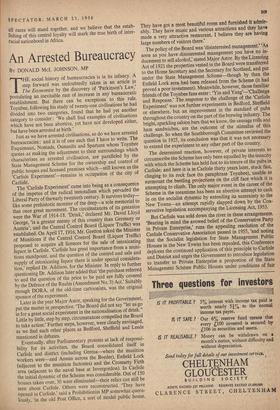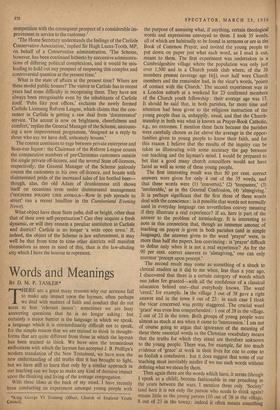An Arrested Bureaucracy
By DONALD McI. JOHNSON, MP THE social history of bureaucracies is in its infancy. A step forward was undoubtedly taken in an article in The Economist by the discovery of 'Parkinson's Law,' postulating an inevitable rate of increase in any bureaucratic establishment. But there can be exceptions to this rule. Toynbee, following his study of twenty-one civilisations he had divided into two categories, found that he had yet another category to consider : 'We shall find examples of civilisations which have not been abortive, yet have not developed either, but have been arrested at birth.'
Just as we have arrested civilisations, so do we have arrested bureaucracies : and it is of one such that I have to write. The Esquimaux, Nomads, Osmanlis and Spartans whom Toynbee quotes as making the adjustment to their surroundings which characterises an arrested civilisation, are paralleled by the State Management Scheme for the ownership and control of public hou,ses and licensed premises which—still known as the 'Carlisle Experiment'—remains in occupation of the city of Carlisle.
The 'Carlisle Experiment' came into being as a 'consequence of the impetus of the radical teetotalism which pervaded the Liberal Party of theearly twentieth century. It survives today— like some prehistoric monster of the deep—a sole memorial to that once great movement. The circumstances of its gestation were the War of 1914-18. 'Drink,' declared Mr. David Lloyd George, 'is a greater enemy of this country than Germany or Austria'; and the Central Control Board (Liquor Traffic) was established. On April 17, 1916, Mr. Gretton asked the Minister of Munitions if the Central Control Board (Liquor Traffic) proposed to acquire all licences for the sale of intoxicating liquor in Carlisle. 'Carlisle has great importance from a muni- tions standpoint, and the question of the control and sale and supply of intoxicating liquor there is under special considera- tion,' replied Dr. Addison, for the Minister. In reply to further questioning Dr. Addison later added that 'the purchase referred to and the question of the price to be paid are fully covered by the Defence of the Realm (Amendment No. 3) Act.' Suitably enough DORA, of the old-time cartoonists, was the original sponsor of the experiment.
Later in the year Major Astor, speaking for the Government, put the matter in perspective. 'The Board did not say "let us go in for a great social experiment in the nationalisation of drink." Little by little, step by step, circumstances compelled the Board to take action.' Further steps, however, were clearly envisaged, as we find such other places as Bedford, Sheffield and Leeds mentioned in debates.
Eventually, after Parliamentary protests at lack of responsi- bility for its activities, the Board consolidated itself in Carlisle and district (including Gretna—where the munition workers were—and Annan across the Border), Enfield Lock (adjacent to the munition factories) and the Cromarty Firth area (adjacent to the naval base at Invergordon). In Carlisle the initial dynamic of the Scheme was considerable. Out of 150 houses taken over, 30 were eliminated—their relics can still be seen about Carlisle. Others were reconstructed. 'They have opened in Carlisle,' said a Prohibitionist MP somewhat queru- lously, 'in the old Post Office, a sort of model public house. They have got a most beautiful room and furnished it admir- ably. They have music and various attractions and they have made a very attractive restaurant. I believe they are having large numbers of visitors there.'
The policy of the Board was 'disinterested management."As soon as you have disinterested management you have no in- ducement to sell alcohol,' stated. Major Astor. By the Licensing Act of 1921 the properties vested in the Board were.transferred to the Home Secretary and the Secretary for Scotland, and put under the State Management Scheme—though by then the Enfield Lock area had been released from the Scheme (it had proved a poor investment). Meanwhile, however, those familiar friends of the Toynbee fans enter : 'Yin and Yang'—'Challenge and Response.' The response to the challenge of the 'Carlisle Experiment' was not further experiments in Bedford, Sheffield or elsewhere, but an improvement in the standard of pubs throughout the country on the part of the brewing industry. The bright, sparkling saloon bars that we know, the sausage rolls and ham sandwiches, are the outcome of the stimulus of this challenge. So when the Southborough Committee reviewed the question in 1925, its conclusion was that it was not necessary to extend the experiment to any other part of the country.
The determined reaction, however, of private interests to circumscribe the Scheme has only been equalled by the tenacity with which the Scheme has held fast to its tenure of the pubs in Carlisle; and here it is in Carlisle thirty years later, stuck fast, clinging to its rock face (to paraphrase Toynbee), unable to surmount the beetling projections on the cliff face which it is attempting to climb. The only major event in the career of the Scheme in the meantime has been an abortive attempt to cash in on the socialist dynamic by extending its suzerainty to the New Towns—an attempt rapidly slapped down by the Con- servative legislation accompanying the Licensing Act, 1953.
But Carlisle was sold down the river in these arrangements. 'Bearing in mind the avowed belief of the Conservative Party in Private Enterprise,' runs the appealing resolution of the Carlisle Conservative Association passed in 1955, 'and noting that the Socialist legislation for State Management Public Houses in the New Towns has been repealed, this Conference deplores the continued application of this principle to Carlisle and District and urges the Government to introduce legislation to transfer to Private Enterprise a proportion of the State Management Scheme Public Houses undei conditions of fair competition with the consequent prospect of a considerable im- provement in service to the customer.'
'The Home Secretary understands the feelings of the Carlisle Conservative Association,' replied Sir Hugh Lucas-Tooth, MP, on behalf of a Conservative administration. 'The Scheme, however, has been continued hitherto by successive administra- tions of differing political complexions, and it would be mis- leading to hold' out any prospect of reopening this complex and controversial question at the present time.'
What is the state of affairs at the present time? Where are these model public houses? The visitor to Carlisle has in recent years had some difficulty in recognising them. They have not always been recognisable even by the inhabitants of Carlisle itself. 'Pubs like post offices,' exclaims the newly formed Carlisle Licensing Reform League, which claims that the con- sumer in Carlisle is getting a raw deal from 'disinterested' service. The accent is now on brightness, cheerfulness and comfort,' replies the General Manager of the Scheme, announc- ing a new improvement programme, 'designed as a reply to those who say we have dull, unhomely houses.'
The contest continues to rage between private enterprise and State-run liquor: the Chairman of the Reform League counts the comparative numbers of pre-Christmas customers outside the single private off-licence, and the several State off-licences, respectively: the General Manager of the Scheme jealously counts the customers in his own off-licence, and boasts with disinterested pride of the increased sales of his bottled beer— though, alas, the old Adam of drunkenness still shows itself on occasions even under disinterested management ('SOLDIERS FOUGHT LIKE ANIMALS—ROW in pub spreads to street' ran a recent headline in the Cumberland Evening News).
What object have these State pubs, dull or bright, other than that of their own self-perpetuation? Can they acquire a fresh dynamic, or will they remain a peculiar institution in Carlisle and district? Carlisle is no longer 'a wide open town.' If, indeed, the object of the Scheme is law enforcement, it may well be that from time to time other districts will manifest themselves as more in need of this, than is the law-abiding city which I have the honour to represent.



































 Previous page
Previous page